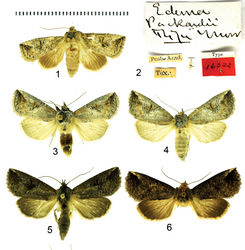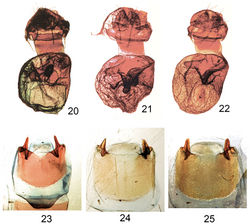Elasmia packardii
| Notice: | This page is derived from the original publication listed below, whose author(s) should always be credited. Further contributors may edit and improve the content of this page and, consequently, need to be credited as well (see page history). Any assessment of factual correctness requires a careful review of the original article as well as of subsequent contributions.
If you are uncertain whether your planned contribution is correct or not, we suggest that you use the associated discussion page instead of editing the page directly. This page should be cited as follows (rationale):
Citation formats to copy and paste
BibTeX: @article{Metzler2011ZooKeys149, RIS/ Endnote: TY - JOUR Wikipedia/ Citizendium: <ref name="Metzler2011ZooKeys149">{{Citation See also the citation download page at the journal. |
Ordo: Lepidoptera
Familia: Notodontidae
Genus: Elasmia
Name
Elasmia packardii (Morrison, 1875) comb. n. – Wikispecies link – Pensoft Profile
Description
Overall color light gray blue to gray with obscure transverse forewing markings, sometimes showing slight brownish shadings over reniform spot and in postmedial and subterminal areas. Males and females similar in appearance; male antenna narrowly bipectinate in basal ¾, with dense setae on ventral surface. Female antenna filiform for entire length, with sparse setae. Apex of forewing marked with a diagonal white and dark shade. Forewing length in males 12–15 mm (mean = 14 mm, n = 72), and in females 13–16 mm (mean = 14 mm, n = 25). Male genitalia (Figs 11–13) distinguished by a helmet-shaped uncus with gradually widening sides. Female genitalia (Fig. 20) with membranous papilla anales partially hidden from view. Ductus bursae broad and short, dorso-ventrally compressed; corpus bursae, round in profile, with a single shark tooth-shaped signum, also with a heavily sclerotized, perpendicular, thumb-like projection ventrally and a sclerotized finger-like pocket appressed to corpus bursae dorsally. Deciduous cornuti from male vesica may be found in corpus bursae.
Remarks
Morrison (1875)[1] described Elasmia packardii from Waco, Bosque County, Texas (Fig. 2) based on a single female specimen (Fig. 1). Adults are on the wing from April through early October.
Distribution and Biology
Elasmia packardii occurs in Texas, Arizona, New Mexico, Oklahoma, and Kansas (Fig. 26); it is common at Carlsbad Caverns National Park. Its distribution in Mexico is unknown. The larvae feed on Ungnadia speciosa Endl. (Mexican buckeye) (R.O. Kendall specimens in TAM) and Sapindus saponaria var. drummondii (Hook. & Arn.) L. Benson (soapberry tree) (both Sapindaceae) (R.O. Kendall specimens in AMNH and TAM).
Taxon Treatment
- Metzler, E; Knudson, E; 2011: A new species of Elasmia Möschler from New Mexico and Texas, and a new subspecies of Elasmia mandela (Druce) from Texas and Oklahoma (Lepidoptera, Notodontidae, Nystaleinae) ZooKeys, 149: 51-67. doi
Other References
- ↑ Morrison H (1875) Notes on North American Lepidoptera. Annals of the Lyceum of Natural History of New York 11: 91-104. doi: 10.1111/j.1749-6632.1876.tb00066.x
Images
|



